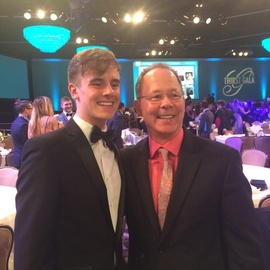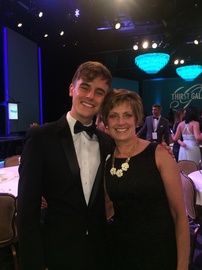Peter and Cheryl Franta
RPCVs Tonga 1982-1984
Connor Franta
Ann Paisley Chandler: A Towering Task: A Peace Corps Documentary is in the works. Why is it important that this is a community supported effort, and why do you think Americans, beyond Peace Corps Volunteers, should care?
Cheryl Franta: In my experience, especially in the United States, people tend to live in a glass bubble and fairly unaware of what is happening in other countries. I also think that even when there is an awareness, there is still a feeling of helplessness on what to do about it or whether one person can make a difference. The Peace Corps and this documentary are important tools in educating people on the possibilities. Everyone should care about humanity and how we can best take care of one another. There may come a time when we will need the help.
Peter Franta: Peace Corps is a way we as Americans reach out beyond our borders. If we want more peace and understanding in the world, we should all reach out to people in need.
Ann Paisley: Connor, you are a great storyteller on YouTube. What are your thoughts on what it means for a large community to support the important narratives of our lives?
Connor Franta: YouTube has been such a blessing in my life and I'm sure the lives of many. I've learned most of what I know today purely from the films, vlogs, tutorials and stories of the true, authentic people in the community who post on that website. To be able to gain access into the life of a person anywhere in this world right now, to see what they see and how they live is truly priceless. Becoming aware of those important narratives is only the first step though. Next you must reach further to see how you can actually experience it for yourself and put those narratives into action.
Ann Paisley: Would you speak on the projects you were involved in as Peace Corps Volunteers in the Kingdom of Tonga?
Cheryl: I was brought there to work in curriculum development on the main island of Tongatapu in 1982. The business curriculum in the schools was designed after larger industries in Australia and New Zealand. The idea was to change the curriculum to reflect the smaller industries in Tonga. When the Peace Corps realized that the Education Department was not providing someone for me to work with, I was moved to a women's business college where I taught classes such as Business English and Shorthand.
My secondary project was teaching aerobic classes. A volunteer who arrived one year ahead of me started teaching classes and I joined her. It proved to be the most rewarding thing I did during my two years in Tonga. We organized a yearly "Fitness Fair" to promote health and raise money to pay for the electricity we used when teaching the classes. Peace Corps is about working with the people in your assigned country to carry on the projects after we are gone. We were able to mentor two Tongan sisters to continue teaching aerobics.
Peter: I taught preschool/kindergarten English and taught biology, math and science. I also helped with the Fitness Fair Cheryl mentioned by organizing a fitness competition between the different branches of the service represented in Tonga.
Ann Paisley: What were your greatest lessons learned while living and working as Peace Corps volunteers?
Cheryl: I learned what it feels like to be a minority, to be laughed at for doing something not normal to a culture. It has made me more sensitive to the differences and similarities in people and appreciate both. I joined the Peace Corps fully expecting to help people and give of myself as much as I could. What I didn't expect was to get so much more in return.
Peter: Diversity in cultures and acceptance of these differences. I experienced many differences while living and teaching on the island of Eua from parents dressing a child as the opposite sex to physical punishment given by teachers for misbehavior.
Ann Paisley: Connor, how do you find you and your siblings making decisions that reflect upon certain Peace Corps ideals?
Connor: Growing up, I was very aware that my parents were in the Peace Corps together and have always been so proud of them for it. They've continually instilled good morals, healthy work ethic and the importance of giving into our lives. I attribute that dynamic to their involvement with the Peace Corps. It unintentionally impacted our family in such a positive way.
Ann Paisley: The documentary will tell the whole history of Peace Corps, tell it beyond the cliches, and will tie it to a current day context. Why is it important to tell the Peace Corps story now?
Cheryl: I think with so much unrest in the world, it is important for people to see what the Peace Corps has done and continues to do. Empowering and motivating people to give back is a positive thing!
Peter: We need more cultural understanding in the world. If we can get people to look beyond themselves, then we can begin to understand.
Connor: The one thing I always try to include in the videos I create is a message. Whether big or small, I want the people who view my content to think, learn and hopefully see a new perspective. In a time when so much negativity from around the world is constantly broadcast into our lives through new outlets, I want to uplift and remind people of all the good there is in the world and the potential for a more peaceful world in the future. It's there, you simply need to take the time to help others see it.
Click here to donate. Thank you for your support.
This interview has been condensed and edited by Ann Paisley Chandler.


